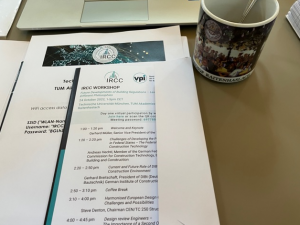Building Standards
The Inter-Jurisdictional Regulatory Collaboration Committee – 25th Anniversary
October 26, 2022 by Simon Moore No Comments | Category Building Standards
Blog post by Stephen Garvin, Head of Building Standards Division
The Inter-jurisdictional regulatory collaboration committee, or IRCC for short, celebrates its 25th anniversary this week (24 to 26 October 2022) with a meeting and conference in Bavaria to discuss a range of contemporary subjects relevant to global building safety and trends influencing the future of building regulation.

The IRCC is an international forum of building regulation and code authoring bodies (see below) with the purpose of promoting effective international collaboration concerning ‘best current practice’ building regulatory systems, in particular those that are functional, objective or performance based. The meeting is complemented by a specialist workshop sponsored by the hosts for the meeting, the German Federal Association of Design Review Engineers (BVPI).
To celebrate the 25th anniversary of the IRCC, a report has been produced showing its origins, history and importantly where it is going next. Details can be found on the IRCC website.
The report traces the origins of the IRRC to a conference in 1996 that had been held to examine performance-based codes and fire safety design methods. It concluded that whilst there were international forums for the relevant engineering and design communities that there were no such networks that addressed the concerns of regulators and policy makers. As a result the concept of the IRCC was born.
Founding members such as John Traw and Brian Meacham of the USA have remained active in IRCC for most of the last 25 years and provide valuable underpinning of its purpose and goals.
The IRCC provides a forum for promoting a common understanding of, and a framework for, building regulatory system development that are objective based and aim to meet societal needs. The pace of development in building regulation systems around the world has never been greater and the IRCC provides an important forum to share experience and learn from each other. Ultimately the development of policy and regulation is for each country to decide, but the international collaboration adds value and an extra dimension.
Over the coming years, IRCC members have identified the following as expected priority topics in their countries:
- Energy Efficiency/ Conservation/ Net Zero
- Accessibility
- Technology and digital transformation
- Indoor Air Quality
- Risk-based building classifications and performance
- Application of technical requirements to existing buildings
- Relationship between building and planning regulations.
The Scottish Government is grateful for the collaboration with member organisations and countries over the past quarter century and looks forward to the future programme of engagement.
Thanks go to current IRCC Chair Neil Savery of Australia, IRCC Secretary Judy Zakreski of the USA and Gerhard Breitschaft and Robert Hertle of Germany for the organisation of the 25th anniversary meeting and conference.
Members of the IRCC, 2022:
- Australian Building Codes Board (ABCB), Australia
- Austrian Institute of Construction Engineering (Österreichisches Institut für Bautechnik, OIB), Austria
- Building and Construction Authority (BCA), Singapore
- China Academy of Building Research (CABR), China
- Department for Levelling Up, Housing and Communities (DLUHC), England
- Bundesvereinigung der Prüfingenieure für Bautechnik e.V. (BVPI), Germany
- German Institute for Building Construction (Deutsches Institut für Bautechnik (DIBt), Germany
- Institute for Research in Construction, National Research Council (NRC), Canada
- International Code Council (ICC), USA
- Instituto de Ciencias de la Construccion Eduardo Torroja (CSIC), Spain
- Ministry of Business, Innovation and Employment (MBIE), New Zealand
- Ministry of Land, Infrastructure, Transport and Tourism (MLIT), Japan
- Ministry of Transport, Mobility and Urban Agenda (MITMA), Spain
- National Board of Housing, Building and Planning, (Boverket), Sweden
- National Institute for Land and Infrastructure Management (NILIM), Japan
- Netherlands Organisation for Applied Scientific Research (TNO), Netherlands
- Norwegian Building Authority (DIBK), Norway
- Singapore Civil Defence Force (SCDF), Singapore
- Scottish Government Building Standards Division (BSD), Scotland.

Leave a comment